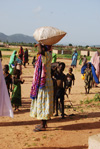
As U.S. Director of National Intelligence Dennis Blair noted recently, it is not only unwise, it is downright dangerous to avoid considering the severe and wide-ranging effects of the global economic crisis around the world.
The World Bank has predicted that the economic crisis will push 46 million into poverty in 2009. Unsurprisingly, many keyed in sources note that the economic crisis is quickly creating destabilizing risks in developing nations and threatening already vulnerable groups, such as women and girls. As Dominique Strauss-Kahn, the head of the International Monetary Fund, warned at a recent conference in Tanzania, the “threat” of the economic crisis in Africa:
…is not only economic, there is a real risk that millions will be thrown back into poverty…This is not only about protecting economic growth or household incomes, it is also about containing the threat of civil unrest, perhaps even a war.
Strauss-Kahn also notes that since the financial crisis comes on the heels of the food crisis of 2008, its effects are compounded for nations already battling food insecurity. Reuters has a helpful fact sheet anticipating how sub-Saharan African economies will fare.
Reuters predicts that although Zimbabwe’s “currency is almost worthless, food and fuel are scarce, [and] mining output has followed agricultural production into the slump,” Zimbabwe’s economy could “grow faster than anywhere,” (which, given its abysmal lows now, isn’t as hopeful a statement as it seems) if the new government proves to be successful. Meanwhile, the Democratic Republic of the Congo’s economy will likely face serious trouble. This news is also unsurprising, given that the government has extremely low financial reserves and that plummeting copper prices are bursting at least part of the minerals boom—as this Financial Times article powerfully describes.
Some of the reasons why the economic crisis acutely hurts developing countries are obvious. However, this recent Los Angeles Times op-ed raised some more vexing issues:
[The economic crisis] is a disaster for the bottom billion, the one out of six humans living on less than $2 a day. But as always, the poor have a problem getting our attention—especially when the rich have lost half their wealth…
At the same time, emergency food aid and “hand outs” will not address the root causes of food insecurity, which, as the past year has shown, is only exacerbated in periods of economic downturn. And as BBC commentator and Professor Ngaire Woods recently noted, the effect of the financial crisis on the world’s poorest nations is distinctly different than the crisis’ effects on the richest nations. Furthermore, Woods argues that as the crisis continues its downward spiral, the needs of the “bottom billion” are arguably much “more urgent” than the needs of rich nations.
As the G20 summit in London looms, the international community should take this opportunity to think creatively about more comprehensive foreign aid policies that address not only the causes of chronic food shortages and financial insecurity in developing nations, but that connect the dots between these issues and their relationship to broader political instability around the world, from Sri Lanka to Senegal.
Laura Heaton contributed to this post.

